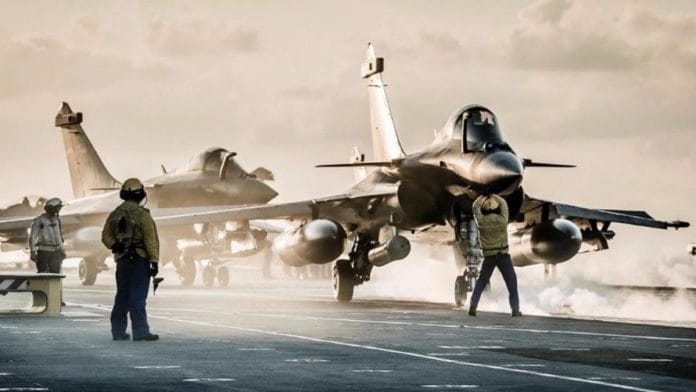New Delhi: India and France are set to ink key agreements that would pave the way for new fighters and submarines for the Indian Navy during Prime Minister Narendra Modi’s upcoming visit to the country for the Bastille Day parade this week, ThePrint has learnt.
On the agenda are a deal to procure 26 naval version of the Rafale fighter jets, three additional Scorpene submarines and a possible partnership for 100 percent technology transfer for jet engine technology.
Sources in the defence and security establishment said if all goes well, New Delhi could announce its intention of buying the Rafale Marine, also known as Rafale-M for the Indian Navy.
However, no contract will be signed because the deal will then go through a cycle of cost negotiations, like the time when Rafale was bought, and a final deal would be inked only after the next general elections slated for early next year.
As reported first by ThePrint in December last year, the Indian Navy has shortlisted the Rafale M for its aircraft carrier operations against the American F/A 18 Super Hornets.
The naval headquarters had then sent a report to the defence ministry mentioning the “positives” only, and that Rafale-M met all criteria. Sources had then said that there was no mention of the Boeing aircraft.
Another key important project is the Project 75 under which six Scorpene class submarines have been built in India with partnership with state-un Mazagon Dock Limited (MDL).
The Indian Navy is pursuing Project 75 India, under which new underwater vessels are to be made with a different technology.
The French are out of the race for the new project because they don’t meet key tender requirements of the Indian Navy.
Sources said that the French through their India partner MDL have proposed to the government to build three more Scorpene submarines with the Indian shipyard making a case for expertise gained while building the vessels do not go to waste.
It is understood that the Indian Navy feels that three more Scorpene class submarines can be built since the P75I programme is delayed and could take time for it to see the light of the day.
The Indian Navy is facing a submarine crisis and has fallen back on its 30 year plan which ends in 2030.
Under the ambitious 30-year plan that ends in 2030, India was to build 24 submarines — 18 conventional submarines and six nuclear-powered submarines (SSNs) — as an effective deterrent against China and Pakistan.
Of the 18 conventional submarines, Indian Navy has managed only 6 so far.
Defence Minister Rajnath Singh will chair a crucial meeting of the Defence Acquisition Council this week once he returns back from Malaysia where he is currently on a visit.
Another deal that India is looking at is the pact for aircraft engines that will involve coming out with a new powerful engine together to power India’s futuristic Advanced Medium Combat Aircraft (AMCA) fighter jet.
The AMCA will be the cornerstone of the Indian Air Force’s manned tactical fleet within the next decade. Negotiations between the two sides are on for quite some time with no breakthrough happening over work share and cost involved.
India’s state-run Hindustan Aeronautics Limited (HAL) and French firm Safran Helicopter Engines have already partnered for the joint development of the engine intended for the future 13-ton IMRH (Indian Multi-Role Helicopter) and its naval version DBMRH (Deck Based Multi-Role Helicopter).
The French firm is also giving seven critical forging and casting raw parts, for further enhancement of indigenous content in the Shakti engine of Dhruv Advanced Light Helicopter (LAH) and Light Combat Helicopter (LCH) programmes.
Besides these critical defence deal, another project that will come up for discussion is Jaitapur nuclear power plant, they said.
Both India and France are looking at speeding up the delayed project to set up nuclear power reactors at Jaitapur in Ratnagiri district of Maharashtra. This is France’s biggest civil nuclear project abroad and has been under discussion for over 14 years.
(Edited by Tony Rai)
Also Read: India-France space alliance key to Delhi’s ambitions. But it must deepen ties with Quad too






